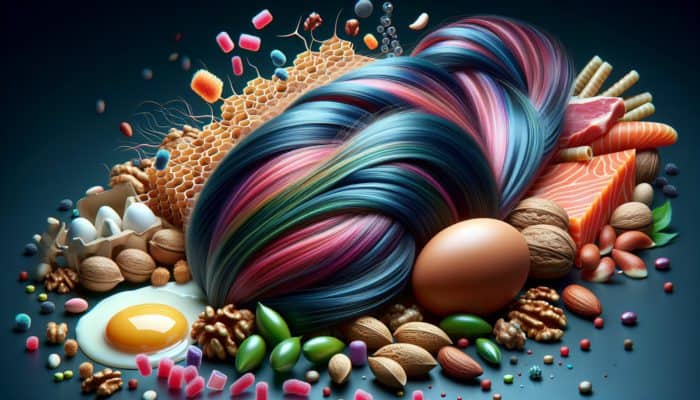Understanding the Impact of Menopause on Hair and Its Consequences for Women
Menopause is a profound and natural phase in a woman’s life, generally occurring between the ages of 45 and 55, signalling the end of her reproductive years. This significant transition not only introduces numerous physical changes but also has a considerable effect on overall health, particularly on the state of hair. The fluctuations in hormones during menopause, especially the decline in oestrogen and progesterone, can lead to various hair-related challenges. It is crucial for women to understand these changes to manage and address the hair conditions that often arise during this vital stage of life effectively.
Understanding How Hormonal Changes Influence Hair Health in Menopause

As women approach menopause, they experience significant alterations in their hormone levels. The sharp decline in oestrogen can lead to noticeable changes in hair growth patterns, often resulting in thinning hair and changes in texture. Oestrogen plays a vital role in maintaining hair health by promoting hair growth and regulating the hair growth cycle. When levels of oestrogen decrease, the duration of the hair growth phase may shorten, leading to increased shedding. This process tends to unfold gradually, and it may take several years for the cumulative effects to become visible, often catching women by surprise when they notice these changes.
Additionally, the decrease in progesterone, another critical hormone, can exacerbate hair thinning. Progesterone is essential for keeping hair follicles healthy, and lower levels can make hair strands weaker and more susceptible to breakage. By recognising these hormonal changes, women can better anticipate the shifts in their hair and implement proactive measures in their hair care routines, preparing themselves for these inevitable transitions.
Identifying the Common Hair Issues Women Encounter During Menopause
During the menopausal journey, many women report facing a variety of hair challenges, including thinning, dryness, and increased fragility. Thinning hair typically manifests as a significant loss of volume, making hairstyles appear flat and lifeless. This condition often coincides with dryness, leading to hair that is brittle and more vulnerable to damage. Women may find that their once manageable hair has become frizzy and unmanageable, prompting them to reassess their hair care products and techniques.
The increased fragility of hair means it is more likely to break, creating a harmful cycle of hair loss and further thinning. This decline in hair quality extends beyond mere appearance; it can significantly affect a woman’s self-esteem and overall confidence. Many individuals closely associate their identity with their hair, and these changes can have a profound impact on emotional well-being. Therefore, addressing these hair issues requires a holistic treatment approach that considers both the physical and psychological facets of hair health.
The Importance of Acknowledging the Emotional Impact of Hair Changes
The emotional consequences of experiencing hair changes during menopause are substantial and should not be overlooked. For numerous women, their hair is a core aspect of their identity, and changes can result in feelings of loss and insecurity. The psychological effects can vary from mild frustration to significant anxiety regarding body image. Women may begin to perceive themselves as less attractive or worry about how they are perceived by others, which can lead to reduced social interactions and activities.
It is essential to confront these feelings openly. Seeking support from friends, family, or professional counsellors can be immensely helpful. Women are encouraged to discuss their experiences and emotions, as realising they are not alone in these challenges can provide comfort. Furthermore, engaging in activities that boost confidence—such as learning new styling techniques or experimenting with various hair treatments—can empower women during this transformative life stage, aiding them in reclaiming their sense of self.
Implementing Effective Strategies for Hair Management During Menopause

To effectively manage the hair changes associated with menopause, women should adopt a comprehensive strategy. Using gentle hair care products that are specifically formulated for ageing hair can significantly enhance texture and overall health. Ingredients like keratin, argan oil, and biotin are renowned for their nourishing and strengthening properties, helping to reduce breakage and boost shine.
Moreover, maintaining a well-rounded diet rich in essential nutrients is critical for promoting hair health. Foods that are high in omega-3 fatty acids, antioxidants, and vitamins can greatly support overall hair vitality. Consulting with a healthcare provider or a dermatologist can also provide personalised guidance, including recommendations for specific products or treatments tailored to individual hair concerns and conditions.
Incorporating these strategies into a consistent hair care routine can lead to noticeable improvements. Furthermore, women should consider seeking psychological support options, such as support groups or therapy, to address the emotional complexities of menopause. This holistic approach can significantly enhance how women perceive their hair and themselves during this transitional phase.
Prioritising Psychological Support for Enhanced Mental Well-Being
The availability of psychological support during menopause is just as vital as physical treatments. Joining a support group allows women to connect with others facing similar challenges, creating a safe space for sharing feelings and solutions. Many individuals find solace in discussing hair-related concerns with peers who understand the emotional ramifications of these changes.
Professional counselling can also be an invaluable resource. Engaging with a therapist who specializes in women’s health can help address underlying issues related to self-esteem and body image. Therapeutic approaches, such as cognitive behavioural therapy, can assist women in reframing negative perceptions about their appearance, fostering a more positive self-image and emotional state.
Additionally, integrating mindfulness practices, such as meditation or yoga, can boost emotional resilience. These practices not only help manage stress levels—an essential consideration for hair health—but also contribute to an overall sense of well-being. By prioritising mental health alongside physical hair treatments, women can navigate the complexities of menopause with increased confidence and peace of mind.
Recognising Key Nutrients That Stimulate Healthy Hair Growth
Nutrition plays a crucial role in sustaining healthy hair, particularly during menopause when hormonal changes can make hair more vulnerable to damage. Certain vitamins and minerals are essential for supporting hair growth and strength; ensuring your diet is rich in these nutrients can significantly influence hair health.
Identifying Vitamins and Minerals Vital for Promoting Hair Growth

Essential nutrients such as biotin, Iron, and Zinc are indispensable for hair growth and maintaining a healthy scalp. Biotin, also known as vitamin B7, is well-regarded for its ability to strengthen hair and stimulate growth. Research indicates that a deficiency in biotin can lead to hair thinning, making supplementation a popular choice for individuals experiencing menopausal hair changes. Foods rich in biotin include eggs, nuts, and leafy greens, which should be included in daily meals for optimal results.
Iron is another crucial nutrient that supports healthy hair follicles. An iron deficiency can lead to anaemia, which often manifests as hair loss. Women should consider incorporating iron-rich foods such as red meat, lentils, and spinach into their diets, particularly during menopause when the body’s need for iron increases.
Zinc plays a dual role in hair health by supporting the hair growth cycle and aiding in the repair of damaged strands. Foods high in zinc, including pumpkin seeds, chickpeas, and whole grains, can help maintain robust hair health. Ensuring a balanced intake of these essential vitamins and minerals can significantly contribute to combating hair loss and fostering stronger, healthier hair.
The Critical Role of Protein in Supporting Hair Vitality
Protein is a fundamental building block of hair, making adequate protein intake vital for women navigating menopause. Hair is primarily composed of a protein known as keratin, and without sufficient protein, the body may struggle to effectively produce new hair strands. A diet rich in high-quality protein sources, including lean meats, fish, eggs, and plant-based proteins like beans and quinoa, is crucial for maintaining hair health.
The significance of protein extends beyond hair growth; it also plays an essential role in overall health and vitality. As women undergo hormonal changes during menopause, ensuring adequate protein intake can help sustain energy levels and preserve muscle mass, which may otherwise decline. This comprehensive dietary approach supports not only hair health but also contributes to a more balanced and active lifestyle throughout and beyond menopause.
It is essential to recognise that individual protein requirements can vary based on lifestyle factors such as activity level and overall health. Women should consider consulting a nutritionist or healthcare professional to determine the most suitable dietary plan for their specific needs, ensuring their protein intake adequately supports hair health and overall well-being.
Understanding the Influence of Hydration on Hair Health
Hydration, often overlooked, is a critical element in maintaining healthy hair, especially during menopause. Dehydration can result in dry, brittle hair that is more prone to breakage and damage. Consuming an adequate amount of water throughout the day helps nourish hair follicles and supports overall bodily functions, including hair growth.
In addition to drinking water, incorporating hydrating foods into your diet can further enhance moisture levels. Fruits and vegetables, such as cucumbers, watermelon, and oranges, are not only hydrating but also packed with vitamins and minerals that promote hair health. Furthermore, consider using hair products infused with hydrating ingredients like aloe vera or coconut oil to help lock in moisture and enhance hair vitality.
Women should also remain aware of environmental factors that may contribute to dehydration. Excessive sun exposure, harsh winds, and dry indoor air can strip moisture from hair, increasing the risk of damage. Employing protective hairstyles and treatments can help shield hair from these elements, ensuring it remains hydrated and healthy. Ultimately, maintaining optimal hydration levels, alongside a nutrient-rich diet, can significantly improve hair quality during menopause. Prioritising hydration stands out as a straightforward yet impactful strategy for fostering stronger, healthier hair during this transitional life stage.
Exploring Effective Topical Treatments for Hair Thinning Associated with Menopause
As women navigate the challenges of hair thinning during menopause, topical treatments can offer effective solutions to combat hair loss and stimulate growth. A variety of options exist, including over-the-counter products and prescription treatments, each designed to address different aspects of hair health.
How Minoxidil Can Support Hair Regrowth for Women
Minoxidil is a well-known topical treatment for hair loss, particularly effective for women dealing with thinning hair related to menopause. This FDA-approved solution works by enhancing blood circulation to the hair follicles, thereby encouraging hair growth and reducing shedding. Available in both liquid and foam formulations, Minoxidil is straightforward to apply directly to the scalp and can be transformative for those experiencing menopausal hair loss.
Clinical studies have demonstrated that consistent application of Minoxidil can lead to visible improvements in hair density and thickness. Users typically notice results within four to six months, making it essential to adhere to a consistent routine for achieving the desired outcomes. It is crucial for women to follow the recommended dosage and application instructions to maximise the benefits of this treatment.
While Minoxidil has proven effective for many, it may not be suitable for everyone. Women should consult their healthcare providers to determine whether this treatment aligns with their specific hair concerns and overall health profile. With proper guidance and realistic expectations, Minoxidil can become a vital component of a comprehensive hair care regimen for menopausal women.
Enhancing Hair Growth with Natural Essential Oils
In addition to conventional treatments, exploring the natural benefits of essential oils can boost scalp health and stimulate hair growth. Oils such as rosemary and lavender have been traditionally utilised for their invigorating properties. Rosemary oil, in particular, has been shown to enhance blood circulation to the scalp, encouraging hair follicles to thrive. Meanwhile, lavender oil is celebrated for its calming effects and antimicrobial properties that can benefit scalp health.
To incorporate essential oils into a hair care routine, women can blend a few drops with a carrier oil, such as coconut or jojoba oil, and gently massage the mixture into the scalp. This not only strengthens the hair but also provides a soothing experience that can alleviate stress—an important factor influencing hair health. Regular scalp massages using essential oils can improve circulation and create a healthy environment for hair growth.
While many women experience positive results with essential oils, it is crucial to note that outcomes can vary. Conducting a patch test is always recommended to rule out any allergic reactions. With patience and consistency, essential oils can become a valuable addition to a holistic approach to managing menopausal hair transformations.
Prescriptive Medications for Advanced Hair Thinning
In cases of more pronounced hair loss, healthcare providers may prescribe medications such as finasteride, which has traditionally been used to treat male-pattern baldness and is increasingly recognised for its potential benefits for women as well. Finasteride operates by inhibiting the production of dihydrotestosterone (DHT), a hormone that can contribute to hair thinning.
While this medication can yield promising results, it is crucial for women to be well-informed about potential side effects and to discuss these thoroughly with their healthcare provider. Finasteride may not be suitable for all women, particularly those who are pregnant or planning to conceive. A healthcare professional can assist in determining the most appropriate treatment based on individual health history and the severity of hair loss.
When exploring prescription options, women should also recognise the importance of a comprehensive treatment plan that may include lifestyle adjustments, dietary changes, and supportive therapies. Combining medical treatments with natural remedies can enhance overall effectiveness and support optimal hair health during menopause.
Quick Relief Options: Over-the-Counter Solutions for Thinning Hair
For those seeking immediate solutions without a prescription, a variety of over-the-counter products are specifically formulated to encourage hair growth and mitigate hair loss. Shampoos, conditioners, and serums enriched with ingredients like biotin, Caffeine, and saw palmetto can provide an additional layer of support for thinning hair.
Biotin-infused hair care products are particularly popular, as this vitamin is renowned for its ability to strengthen hair and promote healthy growth. Caffeine is another intriguing ingredient that studies suggest may stimulate hair follicles and enhance growth. Many women find that incorporating these products into their daily routines can lead to noticeable improvements in hair thickness and overall health.
When selecting over-the-counter options, it is crucial for women to carefully read labels and choose products that align with their specific hair concerns. Trial and error may be necessary to identify the right combination that works best for individual hair types and conditions. By remaining informed and proactive, women can effectively navigate the multitude of products available and select the optimal solutions for achieving healthy, vibrant hair throughout menopause.
Enhancing Scalp Health and Stimulation for Optimal Hair Growth
To maintain healthy hair during menopause, it is essential to prioritise scalp care and stimulation. A healthy scalp lays the groundwork for robust hair growth, making it imperative to adopt practices that promote optimal scalp health.
The Benefits of Regular Scalp Massages for Hair Growth
Scalp massages serve as an effective method to enhance blood circulation and stimulate hair follicles. This practice encourages nutrient-rich blood flow to the scalp, which is vital for fostering healthy hair growth. Not only do scalp massages support hair vitality, but they also offer a relaxing experience that can help alleviate stress—an important factor often associated with hair loss during menopause.
To perform a scalp massage, gently use your fingertips to apply pressure in circular motions across the scalp, concentrating on areas where hair thinning is more noticeable. This practice can be amplified by using essential oils or hair serums that nourish the scalp, further enhancing the overall health of the hair.
Integrating regular scalp massages into your routine can serve as a delightful self-care ritual. Many women find that dedicating just a few minutes each day to this practice can yield significant improvements in hair vitality over time, reinforcing the idea that caring for the scalp is equally as important as caring for the hair itself.
Effective Scalp Exfoliation Techniques for Hair Health
Just as the skin benefits from exfoliation, the scalp does too. Gentle exfoliation can help remove dead skin cells and product build-up that may otherwise clog hair follicles and hinder healthy growth. Utilizing a scalp exfoliating treatment or a clarifying shampoo once or twice a month can help maintain a clean scalp and promote healthy hair.
When selecting exfoliation products, look for those containing natural ingredients like sugar or sea salt, which can provide gentle yet effective results. Alternatively, DIY scalp scrubs made from natural ingredients can also be an appealing option. Regular exfoliation not only helps maintain a clean and healthy scalp but also enhances the efficacy of other hair treatments by allowing deeper penetration.
Women should also exercise caution against over-exfoliating, as this can lead to irritation and dryness. A balanced approach is crucial to ensuring the scalp remains healthy while supporting hair growth throughout the menopausal transition.
Optimal Scalp Health Products for Hair Growth
Investing in shampoos and treatments specifically designed for scalp health can yield substantial benefits for hair growth. Products that focus on fostering a healthy scalp environment often contain ingredients such as tea tree oil, menthol, and niacinamide, all of which can contribute to scalp balance and vitality.
Tea tree oil, known for its antimicrobial properties, can help alleviate scalp issues such as dandruff and inflammation, which can obstruct hair growth. Additionally, menthol provides a cooling effect that may stimulate blood flow, further enhancing scalp vitality. Niacinamide, or vitamin B3, can improve the overall texture of the scalp, promoting a healthier environment for hair follicles.
Incorporating these products into a regular hair care regimen can lead to noticeable improvements in scalp health and subsequently hair growth. Women should consider experimenting with different formulations to identify the right combination that caters to their unique hair and scalp needs, ensuring they have access to effective solutions throughout menopause.
The Role of Scalp Stimulation Tools in Promoting Circulation
Scalp stimulation tools, including brushes and massagers, can enhance circulation and promote hair growth when used consistently. These tools are specifically designed to invigorate the scalp and assist in distributing natural oils, leading to healthier hair.
Using a soft-bristled brush or a dedicated scalp massager can increase blood flow to the hair follicles, improving nutrient delivery and fostering hair vitality. Many women find that integrating these tools into their hair care routine not only supports hair health but also provides a soothing experience that helps reduce stress.
The key is to handle these tools with care; aggressive brushing can lead to hair breakage and damage, particularly for women experiencing thinning hair during menopause. By adopting a gentle approach to scalp stimulation, women can enhance both scalp health and overall hair quality during this transitional period.
Assessing Lifestyle Factors That Affect Hair Health
Lifestyle choices significantly influence hair health, particularly during menopause. Factors such as stress management, sleep quality, and habits regarding smoking and alcohol consumption can profoundly affect the condition of hair.
Effective Stress Management Techniques for Hair Health
Stress is a well-documented contributor to hair loss, making effective stress management essential for maintaining healthy hair during menopause. Elevated stress levels can lead to a condition known as telogen effluvium, in which hair follicles prematurely enter the shedding phase. This can exacerbate hair thinning and complicate efforts to achieve healthy hair growth.
To combat stress, women should explore various relaxation techniques that resonate with their personal preferences. Practices such as yoga, meditation, and deep-breathing exercises can significantly reduce stress levels while promoting an overall sense of well-being. Additionally, engaging in hobbies, spending quality time with loved ones, and prioritising self-care can all contribute to a more balanced lifestyle.
By adopting proactive stress management strategies, women can cultivate a supportive environment for hair health. Addressing stress not only benefits hair but also enhances overall mental and emotional well-being during the menopausal transition.
How Quality Sleep Supports Optimal Hair Growth
Quality sleep is intricately linked to overall health, including hair growth and maintenance. During menopause, hormonal shifts can lead to sleep disturbances such as insomnia or night sweats, exacerbating the emotional and physical challenges faced by women.
Emphasising sound sleep hygiene can improve overall sleep quality and subsequently support hair health. Establishing a consistent sleep schedule, creating a calming bedtime routine, and optimising the sleep environment can collectively contribute to improved rest. Furthermore, considering natural remedies such as herbal teas or supplements that promote relaxation can further enhance sleep quality.
When women focus on achieving restorative sleep, they may notice a positive impact on their hair’s health and vitality. A well-rested body is better equipped to facilitate the hair growth cycle, contributing to thicker, stronger hair during menopause.
Evaluating the Effects of Smoking and Alcohol on Hair Health
Both smoking and excessive alcohol consumption can negatively affect hair health during menopause. Smoking constricts blood flow and can impede nutrient delivery to hair follicles, leading to diminished hair quality and increased hair loss. Moreover, the toxins found in cigarette smoke can harm hair and accelerate the aging process.
Similarly, excessive alcohol intake can dehydrate the body, causing hair to become dry and brittle. Alcohol abuse can also disrupt hormonal balance, further contributing to hair loss during menopause. Women are encouraged to limit alcohol consumption and consider quitting smoking to enhance not only hair health but overall well-being.
By adopting healthier lifestyle choices, women can markedly improve their hair’s resilience and vitality during menopause. Implementing positive changes can yield long-term benefits, ensuring that hair remains healthy and strong throughout this transitional phase of life.
Adjusting Hair Care Routines for Maximum Effectiveness
As women confront the challenges of hair changes during menopause, modifying hair care routines becomes imperative. Minor adjustments in hair care practices can lead to significant enhancements in overall health and appearance.
Selecting the Best Shampoo and Conditioner for Menopausal Hair
Choosing the right shampoo and conditioner is vital for addressing menopausal hair changes. Women should look for products designed to nourish and strengthen thinning hair. Ingredients such as keratin, collagen, and natural oils can provide essential hydration and strengthening benefits, ensuring that hair remains healthy and vibrant.
Opting for shampoos that are free from harsh sulfates and parabens is ideal, as these chemicals can strip hair of its natural oils, exacerbating dryness and brittleness. Instead, choose gentle, hydrating cleansers that cleanse the scalp without causing further damage. Conditioners that offer deep moisture and repair are equally critical in combating dryness and improving manageability, making hair more resilient against the effects of menopause.
By dedicating time to select high-quality hair care products, women can significantly enhance the health and appearance of their hair during menopause. Tailoring hair care routines to address the specific needs of menopausal hair can lead to improved texture and vitality, empowering women to feel confident in their appearance.
Practising Caution with Heat Styling Tools
Heat styling can exacerbate damage for women already experiencing hair changes during menopause. Excessive heat can weaken hair strands, leading to increased breakage and thinning. To protect hair from heat damage, women should consider reducing the frequency of heat styling and exploring heat-free alternatives that maintain hair integrity.
When heat styling is unavoidable, implementing precautions such as using a heat protectant spray or lowering the temperature of styling tools can help mitigate damage. Embracing natural textures or styles that require minimal heat can preserve hair health while allowing women to express their individuality without compromising their hair’s strength.
By being mindful of heat styling practices, women can protect their hair from additional deterioration, ensuring it remains as healthy and strong as possible during menopause.
The Importance of Regular Hair Trimming for Maintenance
Regular trims play a crucial role in maintaining hair health, especially during menopause when hair may be more susceptible to split ends and damage. Scheduling trims every six to eight weeks can help remove damaged ends, promoting a healthier appearance and preventing further breakage.
Trimming hair not only enhances its overall health but can also create the illusion of thickness and volume. This can be particularly beneficial for women experiencing thinning hair, as a fresh trim can provide the appearance of fullness. When planning trims, women should consult their hairstylist about the optimal cut that will complement their hair type and desired style.
Incorporating regular trims into a hair care routine serves as a straightforward yet effective strategy for maintaining healthy hair during menopause. By prioritising hair health through consistent trimming, women can enjoy a more vibrant and manageable mane throughout this transitional period.
Exploring Professional Treatments and Expert Consultations
For women experiencing significant hair changes during menopause, seeking professional treatments and expert consultations can provide tailored solutions that address individual needs. From dermatologists to hair restoration specialists, a variety of options are available to support hair health.
How Consulting a Dermatologist Can Provide Tailored Guidance
Visiting a dermatologist is an excellent first step for women experiencing hair loss during menopause. Dermatologists specialise in skin and hair health, providing personalised recommendations based on an individual’s specific condition. They can assess the extent of hair loss, identify potential underlying causes, and suggest appropriate treatments tailored to the individual.
During a consultation, women should be prepared to discuss their medical history, lifestyle factors, and any treatments they have previously attempted. This information will assist the dermatologist in formulating a comprehensive plan that may include topical treatments, oral medications, or lifestyle modifications to support hair health effectively.
Regular follow-up visits can also be beneficial, providing an opportunity to monitor progress and make necessary adjustments to treatment plans. By collaborating with a dermatologist, women can gain valuable insights and access effective solutions for managing their hair changes during menopause.
Exploring Hair Transplant Options for Restoration
For those experiencing severe hair loss, hair transplant options may represent a feasible restoration solution. Hair transplant procedures involve extracting hair follicles from areas of the scalp where hair remains robust and transplanting them to thinning or balding regions. This method can yield natural-looking results and restore confidence for many women.
While hair transplants can be effective, they are not suitable for everyone. Factors such as overall health, the extent of hair loss, and individual preferences should be carefully evaluated. Women interested in this option should consult with a qualified hair restoration specialist to explore the various procedures available and determine the best fit for their personal circumstances.
Investing in a hair transplant can represent a significant decision, and potential candidates should conduct thorough research and seek recommendations to ensure they choose a reputable and experienced provider who can deliver the best results.
The Importance of Ongoing Monitoring for Hair Health
Ongoing monitoring is essential for women experiencing hair changes during menopause. Regular check-ups with healthcare providers or dermatologists can help track progress and facilitate timely adjustments to treatment plans. Hair needs may change as hormonal fluctuations continue, making it vital to remain vigilant and responsive to any new developments.
By proactively scheduling follow-ups, women can stay informed about the latest treatments and strategies for managing hair health. This ongoing relationship with healthcare professionals can provide valuable support, ensuring that women feel empowered to make informed decisions regarding their hair care and treatment options.
Utilising Hormone Replacement Therapy for Managing Hair Loss
Hormone Replacement Therapy (HRT) can serve as an effective approach to managing menopausal symptoms, including hair loss. HRT functions by supplementing the body with hormones, helping to restore balance and alleviate symptoms associated with menopause. For some women, HRT can lead to improvements in hair quality and growth, providing a potential solution for hair thinning.
Before commencing HRT, it is crucial to consult with a healthcare provider to assess the benefits and potential risks. Women should discuss their individual health profiles and any concerns they may have to ensure that HRT is suitable for their specific circumstances and health goals.
By considering HRT as part of a comprehensive strategy for managing menopausal symptoms, women may find relief not only for hair loss but also for other related challenges, ultimately leading to an improved quality of life and enhanced well-being.
Addressing Common Questions About Menopause and Hair Changes
What Are the Primary Causes of Hair Loss During Menopause?
Hair loss during menopause is primarily attributed to hormonal fluctuations, particularly the decrease in oestrogen and progesterone, which can lead to thinning hair and increased shedding.
Can Dietary Adjustments Enhance Hair Health During Menopause?
Yes, maintaining a well-balanced diet rich in essential nutrients such as biotin, iron, and protein can substantially improve hair health and support growth during menopause.
Are There Effective Over-the-Counter Treatments for Hair Loss During Menopause?
Indeed, numerous over-the-counter products, including shampoos and serums containing biotin and caffeine, can assist in reducing hair loss and promoting growth during menopause.
What Strategies Can I Implement to Reduce Stress and Support Hair Health?
Implementing effective stress management techniques such as yoga, meditation, and engaging in hobbies can help alleviate stress and improve hair health during menopause.
Is It Safe to Use Essential Oils for Promoting Hair Growth?
Yes, essential oils such as rosemary and lavender can be beneficial for scalp health and hair growth when used correctly, but it’s important to conduct a patch test beforehand to ensure there are no allergic reactions.
How Often Should I Have My Hair Trimmed During Menopause?
Regular trims every six to eight weeks are advisable to maintain hair health and prevent split ends during menopause, ensuring that hair remains vibrant and manageable.
Can Hormone Replacement Therapy Help With Hair Loss?
Hormone Replacement Therapy (HRT) can be effective in alleviating menopausal symptoms, including hair loss, by restoring hormonal balance and improving overall hair quality.
What Is the Best Method to Cleanse the Scalp?
Utilising a gentle, sulfate-free shampoo that addresses specific scalp concerns can help maintain a clean, healthy scalp and promote hair growth while minimising irritation.
How Long Does It Typically Take to See Results from Minoxidil?
Many users begin to notice results from Minoxidil within four to six months of consistent use, although individual outcomes may differ based on personal factors and adherence to the treatment regimen.
Should I Consult a Dermatologist About My Hair Loss?
Absolutely. A dermatologist can provide personalised advice and treatment options tailored to the specific nature and extent of hair loss during menopause, ensuring an effective management plan.
Connect with us on Facebook!
The Article: Hair Treatments for Menopausal Women: Effective Solutions appeared first on Amitys Hair Salon.
The Article Effective Hair Treatments for Menopausal Women Was Found On https://limitsofstrategy.com



